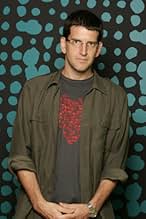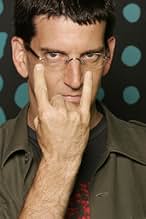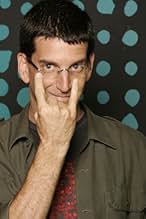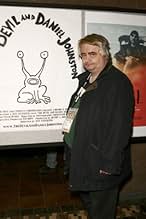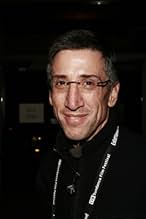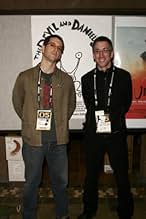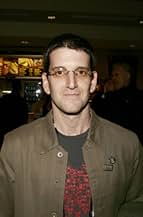The Devil and Daniel Johnston
- 2005
- Tous publics
- 1h 50min
NOTE IMDb
7,9/10
11 k
MA NOTE
Ajouter une intrigue dans votre langueDaniel Johnston, manic-depressive genius singer/songwriter/artist is revealed in this portrait of madness, creativity and love.Daniel Johnston, manic-depressive genius singer/songwriter/artist is revealed in this portrait of madness, creativity and love.Daniel Johnston, manic-depressive genius singer/songwriter/artist is revealed in this portrait of madness, creativity and love.
- Réalisation
- Scénario
- Casting principal
- Récompenses
- 2 victoires et 3 nominations au total
Freddie Mercury
- Self
- (images d'archives)
Avis à la une
I had the opportunity to see this film several days ago while working at the American Film Market, and I have been telling everyone I know to see it. I'm not sure what the deal is with a wide release, but everyone who loves documentary should see this one when it comes out.
For those of you who aren't familiar with the title character, Daniel Johnston is a manic- depressive artist/musician who currently resides in Waller, Texas with his elderly parents. I had been a fan of his music for sometime, and also having lived in Austin, had been aware of his status as a local fixture, but there was so much fascinating information divulged in this film that I never knew about. The film spans the life (up to the present) of this incredibly complex person, who truly resides in a world of his own creation. It's clear that the filmmaker has a deep appreciation and love for Johnston's work, and his world is painstakingly brought to life through animation, recreation, and wonderfully edited home movies and audio cassette tapes. His friends and family also offer insight into the various events which were pivotal in Johnston's life.
The wealth of self-documentation that Johnston has created over his life, starting from childhood, is one of the things that makes this film truly magnificent. Over the years, we can literally see this person change before our eyes, as though gradually being claimed by a dark force. The "dark force" in this case is manic depression; metaphorically The Devil for Johnston, who is a devout Christian. Johnston's struggle to connect with people he loves through the fog of his illness is devastating. While this can be difficult to watch (at least for me), there is the powerful reward of the music and drawings that Johnston has produced throughout, both in spite of and as a direct result of this struggle. That something heartbreakingly beautiful in it's simplicity and honestly can come from such a terrible struggle, is what makes this story and this film remarkable.
For those of you who aren't familiar with the title character, Daniel Johnston is a manic- depressive artist/musician who currently resides in Waller, Texas with his elderly parents. I had been a fan of his music for sometime, and also having lived in Austin, had been aware of his status as a local fixture, but there was so much fascinating information divulged in this film that I never knew about. The film spans the life (up to the present) of this incredibly complex person, who truly resides in a world of his own creation. It's clear that the filmmaker has a deep appreciation and love for Johnston's work, and his world is painstakingly brought to life through animation, recreation, and wonderfully edited home movies and audio cassette tapes. His friends and family also offer insight into the various events which were pivotal in Johnston's life.
The wealth of self-documentation that Johnston has created over his life, starting from childhood, is one of the things that makes this film truly magnificent. Over the years, we can literally see this person change before our eyes, as though gradually being claimed by a dark force. The "dark force" in this case is manic depression; metaphorically The Devil for Johnston, who is a devout Christian. Johnston's struggle to connect with people he loves through the fog of his illness is devastating. While this can be difficult to watch (at least for me), there is the powerful reward of the music and drawings that Johnston has produced throughout, both in spite of and as a direct result of this struggle. That something heartbreakingly beautiful in it's simplicity and honestly can come from such a terrible struggle, is what makes this story and this film remarkable.
Surely this is the most moving piece of film about not just a musician but also a portrait of someone who suffers, copes and lives with depression. Cut together with home movies, family photos, concert footage and interviews old and new it tells the extraordinary life of this very talented but tortured artist. There has always been a link between madness and creativity; artists are slightly different, outsiders, free thinkers, they must be a bit mad to make the work they do. But the story of Daniel is one of actual mania, real madness, deep depression and an immense body of work from, films to music to paintings and sketches. It tells it like it is, it shows him at all times falling apart, going in and out of mental hospitals and still working prolifically. The interviews with his parents are very moving as they at times are reduced to tears and lost for words. Seeing Daniel now how he is as apposed to how he was is also a lump in the throat moment. He sits hunched over his piano, staring into space, banging out song after song and smoking cigarette after cigarette it is heartbreakingly fascinating. But putting his mental health to one side for the moment lets focus on the work, Daniel has amassed literally thousands of tapes full of songs and spoken word, he used to make so many films and has an equally large collection of drawings and art. This amount of work is what makes this documentary so good. You can tell the whole story when it has been so well documented like this from the very beginning right up to the present day every part of Daniels journey is either on tape or film whether it was documented by himself or the likes of MTV. So this portrayal is fascinating, heart-warming and sad but it shows the real genius behind Daniels music that has not only sold records on its own merit but has been covered by over 150 of the worlds top recording artists. If you don't know about Daniel Johnston isn't it about time you found out?
For a crazy person, Daniel Johnston a manic-depressive from West Virginia in his forties now an obese chain-smoker on heavy meds and in the care of his parents, has had a wonderful life and a very creative one as an artist, songwriter and performer who's become a cult figure admired and performed by the likes of Tom Waits, Sonic Youth, and Kurt Cobain. Jeff Feuerzeig, whose title refers to Daniel's constant mental battles with Satan, has provided a rich and sympathetic external portrait; and Johnson's own endless cassette tapes, songs, and drawings (which, used as important sources, can't help bringing to mind such influential recent documentaries as Andrew Jareaki's Capturing the Friedmans and Jonathan Caouette's Tarnation), provide as good a picture of what's going on inside Johnston's head as we're going to get.
Johnston has been celebrated by a long string of artists and become a cult figure to his fans for his purity, innocence, honesty, and raw pain. Like Caouette, he was unappreciated by his parents and particularly his mother, who thought he spent too much time writing songs and drawing pictures when he was young, and called him a "lazy bum" for not doing his chores around the house. His compulsive creativity was never really appreciated by his fundamentalist Christian family, though since thousands of admirers have applauded him at concerts, surely they begin to appreciate it now.
The many films and tapes of him show Daniel was a charming if unstable young man, buoyant, full of fun, uncooperative, laughing in a teenage film he plays both himself and his abusive mom and beginning to compose the songs that others have said sum up the Beatles, Bob Dylan, and other pop greats, though his voice is tuneless and whiny and his piano playing jangly and when he switched to guitar, that was worse. His parents took him out of college because he wasn't doing well, and put him to work. He didn't like that, so they farmed him out to siblings. Luck brought him to Austin in the early Eighties where he worked in a Macdonald's for a surprising length of time considering that he wasn't good at any of the jobs there (he cleared tables) and he was discovered by music writers, an editor, and a man who became his manager and almost his slave (Jeff Tartakov, the manager he fired, who still devotes his life to distributing copies of his tapes).
Johnston had repeated bouts in mental institutions and became increasingly delusional. A period of heavy LSD use clearly led to one of his worst crises: and yet he can recount all this himself, and his mind seems astonishingly lucid. (This is one of the saddest things about madness: that the mad know they're mad, but can do nothing about it.) For all his crises, the Austin public embraced Johnston and he got top awards for folk singing and song writing an event that sat ill with some professional musicians at the time, but satisfied the lust for fame that motivated Johnston, who'd been on MTV, and knew how to grab the spotlight better than he knew how to play his guitar.
I can't see the virtue of Johnston's music and drawings, or rather I can, but I disagree with those in the film who insist he's not an outsider artist. He fits that category well; he's just come along at a time when plaintive whining, alienation, and musical primitivism are the rage, and he was taken up by some admirable champions. However, when he finally got a recording contract drawn up initially when he was in a mental institution his first album issued by Atlantic Records sold only a few thousand copies and he was dropped in two years, showing that despite stars' covers of his songs, he himself has no mainstream appeal, or ability to work in a professional format either as a musician or a visual artist. Nonetheless Johnston's open nature, his clarity, his sense of the redeeming artistic value of love, and his ceaseless artistic productivity are unmistakable and justify the attention that has been lavished upon him. This doesn't stop his story from being ultimately a sad one. For all his parents' caring in latter years, for all his championing by editors and managers, he cannot function on his own. Since his meds stifle his creativity, he has tended to give them up for two weeks before a public performance, and after one of the biggest ones, when his dad was flying the two of them home in his little plane, he overpowered him and took the controls and they crashed into some trees, barely surviving. Well, I guess all artists are a bit reckless, but it's just a matter of degree.
Making full use of films, tapes, and recent interviews, Jeff Feuerzeig has produced a wonderful film that is as good a document of a man as modern techniques allow. And the enduring popular notions of artistic life as train wreck and artistic genius as mental derangement remain unchallenged.
(Feted at fests in mid to late 2005, The Devil and Daniel Johnston went into limited US release March 31, 2006.)
Johnston has been celebrated by a long string of artists and become a cult figure to his fans for his purity, innocence, honesty, and raw pain. Like Caouette, he was unappreciated by his parents and particularly his mother, who thought he spent too much time writing songs and drawing pictures when he was young, and called him a "lazy bum" for not doing his chores around the house. His compulsive creativity was never really appreciated by his fundamentalist Christian family, though since thousands of admirers have applauded him at concerts, surely they begin to appreciate it now.
The many films and tapes of him show Daniel was a charming if unstable young man, buoyant, full of fun, uncooperative, laughing in a teenage film he plays both himself and his abusive mom and beginning to compose the songs that others have said sum up the Beatles, Bob Dylan, and other pop greats, though his voice is tuneless and whiny and his piano playing jangly and when he switched to guitar, that was worse. His parents took him out of college because he wasn't doing well, and put him to work. He didn't like that, so they farmed him out to siblings. Luck brought him to Austin in the early Eighties where he worked in a Macdonald's for a surprising length of time considering that he wasn't good at any of the jobs there (he cleared tables) and he was discovered by music writers, an editor, and a man who became his manager and almost his slave (Jeff Tartakov, the manager he fired, who still devotes his life to distributing copies of his tapes).
Johnston had repeated bouts in mental institutions and became increasingly delusional. A period of heavy LSD use clearly led to one of his worst crises: and yet he can recount all this himself, and his mind seems astonishingly lucid. (This is one of the saddest things about madness: that the mad know they're mad, but can do nothing about it.) For all his crises, the Austin public embraced Johnston and he got top awards for folk singing and song writing an event that sat ill with some professional musicians at the time, but satisfied the lust for fame that motivated Johnston, who'd been on MTV, and knew how to grab the spotlight better than he knew how to play his guitar.
I can't see the virtue of Johnston's music and drawings, or rather I can, but I disagree with those in the film who insist he's not an outsider artist. He fits that category well; he's just come along at a time when plaintive whining, alienation, and musical primitivism are the rage, and he was taken up by some admirable champions. However, when he finally got a recording contract drawn up initially when he was in a mental institution his first album issued by Atlantic Records sold only a few thousand copies and he was dropped in two years, showing that despite stars' covers of his songs, he himself has no mainstream appeal, or ability to work in a professional format either as a musician or a visual artist. Nonetheless Johnston's open nature, his clarity, his sense of the redeeming artistic value of love, and his ceaseless artistic productivity are unmistakable and justify the attention that has been lavished upon him. This doesn't stop his story from being ultimately a sad one. For all his parents' caring in latter years, for all his championing by editors and managers, he cannot function on his own. Since his meds stifle his creativity, he has tended to give them up for two weeks before a public performance, and after one of the biggest ones, when his dad was flying the two of them home in his little plane, he overpowered him and took the controls and they crashed into some trees, barely surviving. Well, I guess all artists are a bit reckless, but it's just a matter of degree.
Making full use of films, tapes, and recent interviews, Jeff Feuerzeig has produced a wonderful film that is as good a document of a man as modern techniques allow. And the enduring popular notions of artistic life as train wreck and artistic genius as mental derangement remain unchallenged.
(Feted at fests in mid to late 2005, The Devil and Daniel Johnston went into limited US release March 31, 2006.)
I saw this at the SXSW movie festival. This movie portrays the legendary song-writer (fans of his consist of: Sonic Youth, Curt Cobain, Beck, etc.), Daniel Johnston's roller-coaster life: through his early recordings in his basement to being on MTV to his battles with manic depression(which caused him to have delusions) to his art and comics and ending up in mental hospitals. Throughout the movie the film looks at Daniel's life through friends and family. Honestly, even if you aren't a fan you'd enjoy it. Even the way it was filmed and put together is so unique it was amazing to watch. A must see for any Daniel Johnston fan.
10lokidog
This film take you on a journey into a creative genius' struggle with life. Daniel Johnston recorded his entire life on cassette tape and his early life on film. Later he appeared on MTV, and in venues in Austin, TX on film and video. These provide the film-maker with a wide array of media for telling this story.
Jeff Feuerzeig weaves this material seamlessly into what is one of the most emotionally wrenching films I've seen in the last year and one of my favorite documentaries ever. It is hard to compare this film with documentaries like those of Michael Moore which are comedic and topical, or those of Errol Morris, which tend to focus on issues and facts. This documentary brings emotional threads and creativity into play in a way that dissolves the usual harsh contrast between a story and it's telling. You forget you are watching a documentary film, and become immersed in Daniel's life. Daniel's effect on those around him is interwoven with his own recordings. His family and friend are there to add to his story to show how his life is reflected upon them. Feuerzeig use of Daniel's parents narrative is simply masterful - it provides important information, and at the same time illustrates the the emotional turmoil his illness causes in the lives of those that love him. Daniel's family is portrayed from the early period of his illness when they have no idea what mental illness really means, to the present time when they become his supporters and advocates. Eventually, family and friend's are shown coming to terms with Daniel's mental illness, and experience their own emotional growth as well.
It deservedly won the Directors Award at Sundance 2005, and I think it would have won the audience award if it had a different play schedule.
Jeff Feuerzeig weaves this material seamlessly into what is one of the most emotionally wrenching films I've seen in the last year and one of my favorite documentaries ever. It is hard to compare this film with documentaries like those of Michael Moore which are comedic and topical, or those of Errol Morris, which tend to focus on issues and facts. This documentary brings emotional threads and creativity into play in a way that dissolves the usual harsh contrast between a story and it's telling. You forget you are watching a documentary film, and become immersed in Daniel's life. Daniel's effect on those around him is interwoven with his own recordings. His family and friend are there to add to his story to show how his life is reflected upon them. Feuerzeig use of Daniel's parents narrative is simply masterful - it provides important information, and at the same time illustrates the the emotional turmoil his illness causes in the lives of those that love him. Daniel's family is portrayed from the early period of his illness when they have no idea what mental illness really means, to the present time when they become his supporters and advocates. Eventually, family and friend's are shown coming to terms with Daniel's mental illness, and experience their own emotional growth as well.
It deservedly won the Directors Award at Sundance 2005, and I think it would have won the audience award if it had a different play schedule.
Le saviez-vous
- AnecdotesAs seen in the DVD extras, Daniel and Laurie would meet again after 30+ years following a screening of this film. She said she kept every memento he gave her and was grateful that he always built up her self esteem and said so many nice things to her when they were friends. The two shared a beautiful moment with a nice hug when they saw each other again.
- Citations
Daniel Johnston: I never met a girl I didn't meet.
- ConnexionsFeatured in Segundo aniversario (2007)
- Bandes originalesSilly Love
Written by Daniel Johnston
Performed by Daniel Johnston
Published by Eternal Yip Eye Music (BMI)
Administered by BUG Music Publishing
Meilleurs choix
Connectez-vous pour évaluer et suivre la liste de favoris afin de recevoir des recommandations personnalisées
- How long is The Devil and Daniel Johnston?Alimenté par Alexa
Détails
Box-office
- Montant brut aux États-Unis et au Canada
- 334 450 $US
- Week-end de sortie aux États-Unis et au Canada
- 23 192 $US
- 2 avr. 2006
- Montant brut mondial
- 432 339 $US
- Durée
- 1h 50min(110 min)
- Couleur
- Mixage
- Rapport de forme
- 1.85 : 1
Contribuer à cette page
Suggérer une modification ou ajouter du contenu manquant


